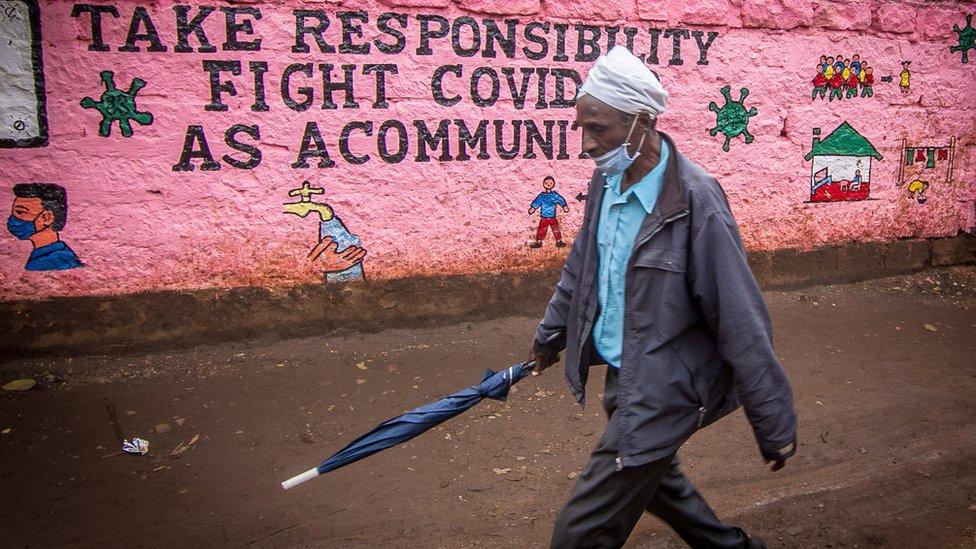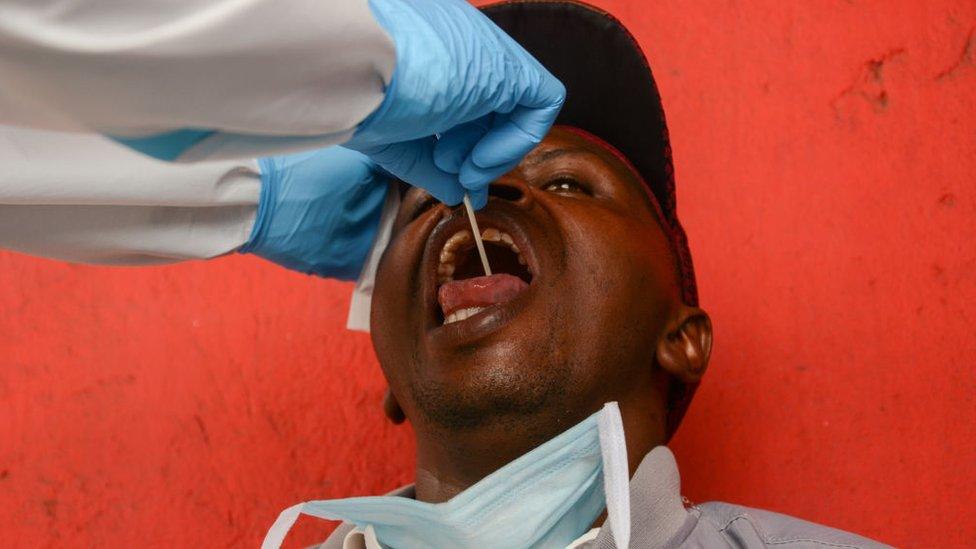Coronavirus in Kenya: Fearing 'money heists' amid pandemic
- Published

In our series of letters from African journalists, Waihiga Mwaura writes from Kenya about concerns that money set aside for the fight against coronavirus is being misspent.
The hashtag #Money Heist has been trending on Twitter in Kenya in recent days - not because of the Netflix series which featured a memorable character called Nairobi but because of a controversial report presented by Health Secretary Mutahi Kagwe to parliament.
The report was a breakdown of how 1.3bn Kenyan shillings ($12.2m; £9.8m), mostly donated by the World Bank, was used in the fight against the coronavirus pandemic.
What caught the attention of the parliamentary committee and Kenyans at large was the cost of some of the items procured or leased.
It showed that 42m shillings was used to lease ambulances, 4m shillings went on tea and snacks, and 70m shillings on communication.

Health services are under pressure to do more testing to curb the spread of Covid-19
Kenya's vibrant online community immediately began to question some of the expenses.
Why lease 15 ambulances at that amount instead of just purchasing new ambulances or using the existing fleet?
Why allocate 2m shillings for mobile phone airtime when telecommunications company Safaricom had offered officials involved in the fight against the virus a free package?
Had the airtime previously allocated to the health ministry for the 2019/2020 financial year already been exhausted?
Why was 70m shillings allocated for communication, bearing in mind that media houses had already contributed to airtime for coronavirus-related news updates?
The questions became all the pertinent amid reports that the lockdown intended to curb the spread of the virus had worsened poverty, even forcing a mother to cook stones to make her eight children believe she was preparing food for them.
Allow X content?
This article contains content provided by X. We ask for your permission before anything is loaded, as they may be using cookies and other technologies. You may want to read X’s cookie policy, external and privacy policy, external before accepting. To view this content choose ‘accept and continue’.

Granted there were a few Kenyans online, such as Ted Ed who, citing his finance background, justified the expenditure, saying he was confident that any audit would give the government "a clean bill of health", external.
Nevertheless, the damage was done and the government was forced to defend itself. President Uhuru Kenyatta denied that any money had been misappropriated or stolen, while Mr Kagwe dismissed the allegations as "propaganda".
Official's tweet deleted
But shortly thereafter Mr Kagwe carried out a reshuffle in his ministry, transferring 30 senior procurement and accounting officers, according to Kenya's leading Daily Nation newspaper.
Was this an already scheduled reshuffle or was it a reaction to the hue and cry over the expenditure?
How can I practise social distancing at work?
What confused many was that the most senior civil servant in the ministry, Susan Mochache, tweeted a statement saying that they had not received the "complete amount of 1 billion kshs from the World Bank and no money had been spent at all". The tweet with those details was hurriedly deleted.
So why did the ministry present a report to parliament with a column entitled "funds used"?
Auditor-general's post left empty
It is possible that no money has been lost but at the least there is a lack of proper co-ordination within the ministry at the forefront of the fight against Covid-19.
Kenyans are worried because the ministry is no stranger to controversy - the auditor-general could not account for 10.9bn shillings allocated to the ministry in the 2017/18 financial year and a similar amount in the 2015/16 financial year.

A SIMPLE GUIDE: How do I protect myself?
AFRICA TRACKER: Updates on the continent's cases
FACE MASKS: Should I be wearing one?
VACCINE: How close are we to finding one?
LOCKDOWNS: The different approaches in Africa

Anti-corruption watchdog Transparency International Kenya has waded into the controversy, calling for greater transparency and accountability of Covid-19 funds.
But the problem is that the post of auditor-general remains vacant nine months after its previous occupant retired.
It is not just in Kenya where there has been a hue and cry over money allocated to fight Covid-19.
We can ill afford a corruption pandemic on top of a health pandemic."

Across the border in Uganda, the High Court ordered MPs to hand back $5,000 (about £4,000) given to each of them to fight coronavirus in their constituencies.
The MPs had allocated themselves about $2.6m in total to raise public awareness about Covid-19.
Their move was widely condemned, with President Yoweri Museveni describing it as "morally reprehensible".
In South Africa, the government is under pressure from the main opposition Democratic Alliance (DA) to explain how 37 million rand ($3m; £1,6m) could be spent on a 40km (25 mile) border fence to keep Zimbabweans with coronavirus out.
Images circulating online show that the razor wire fence has already been cut through, and the DA has described it as a "washing line".
Allow X content?
This article contains content provided by X. We ask for your permission before anything is loaded, as they may be using cookies and other technologies. You may want to read X’s cookie policy, external and privacy policy, external before accepting. To view this content choose ‘accept and continue’.

Meanwhile, nearly 100 civil society organizations from around the world have written to the International Monetary Fund (IMF), external urging it to include anti-corruption measures for emergency funding given to governments whose economies are reeling from the Covid-19 pandemic.
The IMF has already approved almost $15bn to more than 65 countries and is considering requests from at least another two dozen.
Transparency International has issued a timely reminder that about $6m was lost to corruption in Guinea and Sierra Leone during the Ebola outbreak from 2014 to 2016, external.
With social distancing rules and restrictions on gatherings, it will be more difficult for parliamentary watchdog committees to scrutinise Covid-19 spending.
However, we can ill afford a corruption pandemic on top of a health pandemic. So, let us hope that each penny is spent wisely.

More Letters from Africa:

Follow us on Twitter @BBCAfrica, external, on Facebook at BBC Africa, external or on Instagram at bbcafrica, external
